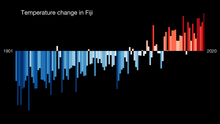
Climate change in Fiji is an exceptionally pressing issue for the country - as an island nation, Fiji is particularly vulnerable to rising sea levels, coastal erosion and extreme weather.[1] These changes, along with temperature rise, will displace Fijian communities and will prove disruptive to the national economy - tourism, agriculture and fisheries, the largest contributors to the nation's GDP, will be severely impacted by climate change causing increases in poverty and food insecurity.[1] As a party to both the Kyoto Protocol and the Paris Climate Agreement, Fiji hopes to achieve net-zero emissions by 2050 which, along with national policies, will help to mitigate the impacts of climate change.[2]
The Human Rights Measurement Initiative finds that the climate crisis has worsened human rights conditions moderately (4.6 out of 6) in Fiji.[3]
- ^ a b COP23. "How Fiji is Affected by Climate Change". Cop23. Archived from the original on 2022-08-28. Retrieved 2021-07-17.
{{cite web}}: CS1 maint: numeric names: authors list (link) - ^ UN Climate Change News (5 March 2019). "Fiji Submits Long-Term National Climate Plan". unfccc.int. United Nations Framework Convention on Climate Change. Retrieved 17 July 2021.
- ^ "Fiji - HRMI Rights Tracker". rightstracker.org. Retrieved 2023-05-01.